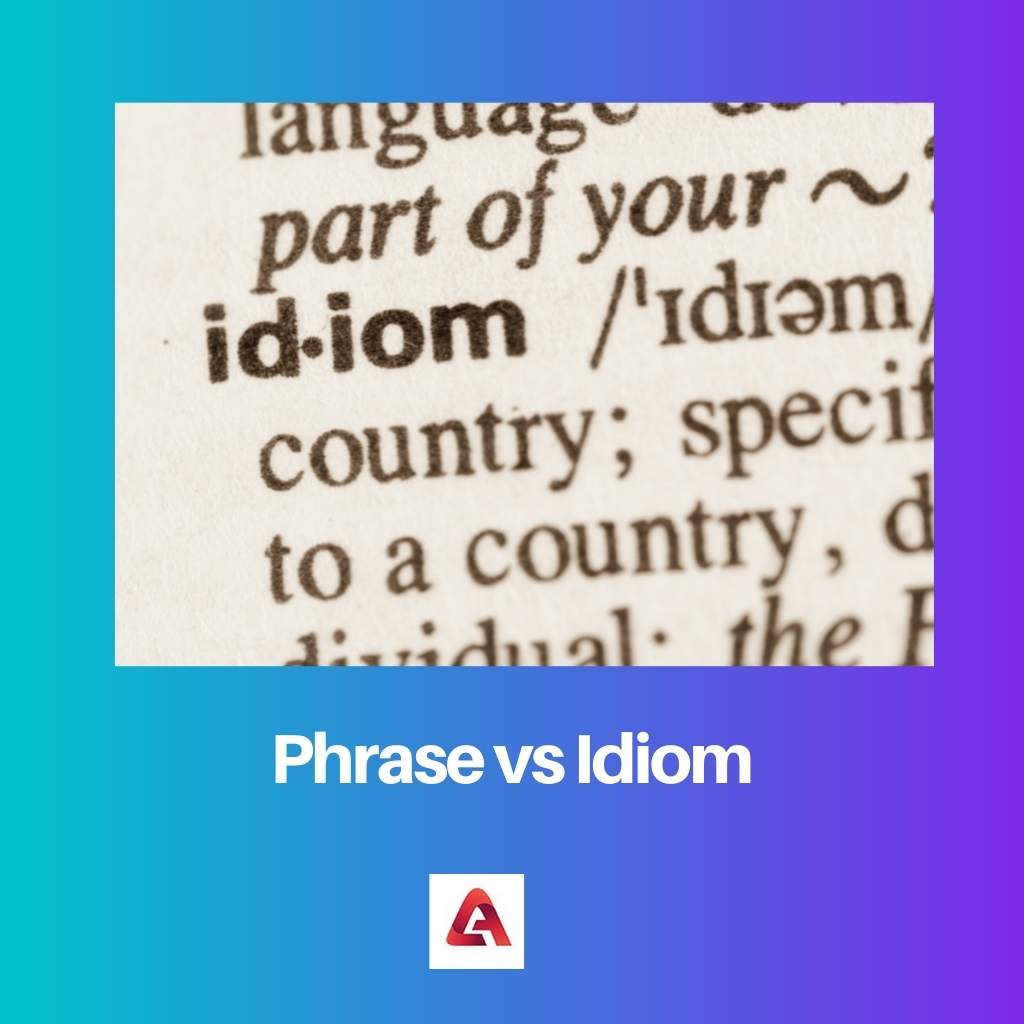Words alone do not contribute or have no definite meaning; therefore, words are paired together to make sentences and used in such manners to make them more alluring.
Key Takeaways
- A phrase is a group of words that convey a specific meaning but do not have a subject or verb.
- An idiom is a group of words with a symbolic meaning different from the literal meaning of the individual words.
- Phrases can be used literally or figuratively, while idioms are always used figuratively.
Phrase vs Idiom
A phrase is a group of words that function together as a unit to convey a specific meaning. Phrases can be simple or complex and can include a subject, a verb, an object, or any other grammatical component. An idiom is a group of words whose meaning cannot be understood from the literal definition of the individual words. Idioms are used in informal language.

Phrases are small collections or groups of words with some literal meaning. They are straightforward to understand, and each word contributes to their meaning. They can be changed easily without any errors.
Idioms are words/word that is not easily understandable and cannot be changed. It can be a group of words or even one word. Translating idioms words by words in the literal meaning is impossible and will give erroneous results.
Comparison Table
| Parameters of Comparison | Phrase | Idiom |
|---|---|---|
| Definition | Group of words | Group of words or a word with no literal meaning. |
| Meanings | Literal in meaning | Figurative in meaning |
| Interchangeability | All phrases are not idioms | Idioms can be phrases |
| Words included | It is a group of words | It can be a single word. |
| Examples | The glass was on the table | Burn the midnight oil |
What is a Phrase?
It is a group of words, small, that has some meaning. There are different types of phrases:
- Noun Phrase: a phrase with a single central noun that can be a subject or even a compliment.
- Adjective Phrase: it consists of a single adjective.
- Adverbial Phrase: this modifies a verb or adjective, working as an adverb.
- Prepositional Phrase: always starts with a preposition and joins nouns.
- Conjunctional Phrase: it performs as a conjunction.
- Interjectional Phrase: it has more than one word.
- Verb Phrase has two types of verbs: the main verb and the helping verb (auxiliary verb).
- Infinitive Phrase: it includes infinite along with a simple verb.

What is Idiom?
Idioms are words that do not have a definite meaning (of their literal words) and act as a common expression. The most common Idioms used daily with their purposes are:
- A blessing in disguise is used in a situation where misfortune has some benefits.
- Beat around the bush: it is used when a person avoids essential things by thinking about unnecessary things.
- Break a leg: it used to wish a person luck.
- Call it a day: it is used when someone says to stop an activity or work.
- Get out of hand: it is used for someone who is very difficult to control.
- Get your act together: it tells a person to start participating in activities or organizing his things appropriately.
Main Differences Between Phrases and Idioms
- The main rule with the phrase is that there must be groups of words that mean more than two words to be a phrase, whereas there is no such rule with idioms; However, it falls under a category of phrases; it has an exception where a single word can be idioms, for example, moonlight.
- Phrases can be idioms or have idiomatic meanings, but most idioms are phrases (having more than 2 words), but there are exceptions.

- https://link.springer.com/chapter/10.1007/978-94-009-7707-5_5
- https://muse.jhu.edu/article/452933/summary
- https://www.sciencedirect.com/science/article/pii/0749596X9290025S
Last Updated : 11 June, 2023


Emma Smith holds an MA degree in English from Irvine Valley College. She has been a Journalist since 2002, writing articles on the English language, Sports, and Law. Read more about me on her bio page.

The knowledge shared in this article is precise and very informative. I enjoyed it
Yes, it is very informative. I have learnt many new things.
I found the section on comparison very interesting
Agreed. Comparing phrases and idioms was an eye-opener
Yes, the comparison table was well structured and very informative
The article is quite engaging and insightful
Indeed, I found it to be quite thought-provoking
The section on the main differences between phrases and idioms was really insightful
I learned a lot from that section
The detailed explanation of phrases and idioms was much appreciated
Kudos to the author for the informative piece
The definitions were crystal clear
I found it a bit complex and hard to understand. Can we have simple examples
I understand the confusion. More simple examples will be helpful
I would have liked more examples to fully grasp the concept presented
This article needs an additional section about the origins of idioms
The comparison table was very helpful. Thanks for including that
I agree, the comparison table clarified many doubts
The information was well presented and easy to understand. Great article!
The author presented the concept in a clear and concise manner
I completely agree, the article is well written